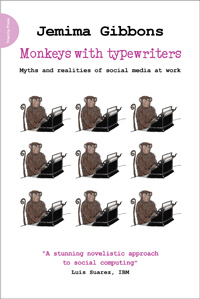27 January 02011
Open, trusting, generous: review of Monkeys With Typewriters, a book on leadership
 As I made my way through the first third of Monkeys with Typewriters
As I made my way through the first third of Monkeys with Typewriters, I was vaguely aware of a tut-tutting from my inner voice, an occasional rolling of my inner eye. "Sheesh, this social media stuff wants to be seen as shiny, new and transformative," they seemed to be saying, "but really it's just another episode in the gradual chipping away at the old Fordist, Taylorist, command-and-control model of the enterprise."
Then I reached page 64, where one of Jemima Gibbons' interviewees argues that, in social media, technology has caught up with ideas that have been around for a generation. Aha! My inner head (?) nods in approval. Who is this shrewd commentator that Jemima has consulted? It's me. Yep, that's me all over: conjuring thoughts that seem original to me, only to find that I've been singing the same old song for years (Jemima interviewed me in 2008).
So that's the disclosure out of the way, and, for helping out as an interviewee, I got a free copy of the book. Jemima and I have moved in similar circles in London since around 2003, when we were both part of Ecademy's now-defunct Media Playground group and when Jemima led Cass Creatives at City Business School. She lists an impressive total of 48 interviews as part of the research for Monkeys with Typewriters, and round about a quarter of them are from what could be loosely called the London social media scene. But (forgive the pun) Jemima also casts her net wide enough to take in key web entrepreneurs from the US (Ross Mayfield, Craig Newmark, Jason Fried, Tim O'Reilly), academics and writers (James Boyle, David Weinberger) and some corporate managers (BT's J.P. Rangaswami, IBM's Gina Poole and Luis Suarez, BBC's Richard Sambrook). There's even one old management visionary from a previous generation, in the shape of Shell's Arie de Geus.
What emerges from this journalistic approach is a very people-centred approach to the topic of leadership and management. You could even say that — in the style of a social network — the story of the book is based around profiles. Certainly Monkeys with Typewriters is very much concerned with the character of leaders in the Web 2.0 world, as its chapter headings — Passion, Openness, Listening, Generosity — suggest. In this way, Jemima really succeeds in giving a humane sense of what's involved in dealing with this new world: she's concerned as much with feelings as with ideas.
But what is the message that common or garden managers will take away from Monkeys with Typewriters? This is where, at the risk of flogging the same point I started with, the song remains pretty much the same. To be a good leader, the story goes, you have to give up control, abandon management by metrics, and learn to trust the people you lead. Business writers have been saying this for almost as long as artists have been trying to shake up the bourgeoisie. Brian Eno once responded to the latter, saying "those poor bourgeoisie: everyone's always trying to shake them up; why don't they give them a little space…" Managers, it seems to me, face a similar dilemma, caught between these repeated exhortations to loosen up and let their people develop their own fully-rounded solutions, on the one hand, and, on the other, ever-present pressures to demonstrate that their commands are as lean and effective as they could possibly be.
We need to recognise that we will never live in a world of completely frictionless communication and totally flat organisations. A big part of the challenge is having the vision to lead people through the many knotty tensions where openness, trust and generosity are most under threat.
At it's best, Monkeys with Typewriters has an ethical inner voice that reminds me of Charles Handy's guides to the future of work from a couple of decades ago, The Age of Unreason and The Empty Raincoat
. Handy was a contemporary of Arie de Geus at both Shell and the London Business School, so perhaps that's no coincidence.
17 January 02011
Do we need an agile learning community of practice?
Here's are the slides for the presentation I gave last Friday at the Be Bettr conference.
Click through to the slideshare page to read the speaker notes for each slide. From my position on the stage, I didn't feel that the delivery was my finest hour, so you're not missing much by not having been there… But the question in the title slide is a genuine, open one for me, so I'd be very grateful for any thoughts and comments, either here, privately or via twitter.
See also Patrick Hadfield's reflections on his involvement in putting together the Unplugged newspaper. [Update, 20 January: and Paul Miller's record of his presentation, which preceded mine.]
6 January 02011
Unplugged! The Agile Learning newspaper
 Here are the copies of the Agile Learning newspaper, of which I took delivery this afternoon.
Here are the copies of the Agile Learning newspaper, of which I took delivery this afternoon.
You can read the full text at the foot of this post, after the links which augment the physical version of the newsletter, including the unabridged versions of the interviews.
If you'd like to keep in touch and find out more about the ideas in the newspaper, there are several things you can do. Tell us what you'd like to see next via the Agile Learning survey. Follow Agile Learning on Twitter, Amplify or Facebook. And if you're near London, please join our meet-up group on Facebook or GroupSpaces.
Editorial
- My background to the interviews — earlier blog posts on this topic: 1, 2, 3, 4
- Fred Garnett's overview
Here are the full versions of the interviews (they're 3-5 times as long as the versions in the newspaper, which could be a good thing or a bad thing, depending on your orientation):
- Dougald Hine, Part 1 and Part 2
- David Jennings
- Annie Weekes
- Tony Hall
- David Gauntlett
- Dick Moore
- Ollie Nørsterud Gardener
- Fred Garnett

Subscribe to my RSS feed, which covers this blog, my book blog, and further commentary on other web resources (more feeds below)
Do we need an agile learning community of practice?
Unplugged! The Agile Learning newspaper
Cinema (24)
Cultural Calendar (86)
Curatorial (66)
E-learning (102)
Events (35)
Future of Music (95)
Human-Computer Interaction (62)
Ideas and Essays (37)
Long Now (18)
Miscellany (44)
Music and Multimedia (157)
Playlists (27)
Podcasting (12)
Politics (12)
Radio (48)
Reviews (58)
Social Software (60)
Teaching (23)
Alternatively, see the Date-based Archives
Recommended: RSS feed that combines items on this site, my book blog, and commentary on other web resources
RSS feed for this site only
RSS feed for my book, Net, Blogs and Rock'n'Roll
RSS feed for shared bookmarks
My latest bookmarks (click 'read more' for commentary):
My archived bookmarks (02004-02008)
On most social sites I am either 'davidjennings' or 'djalchemi', for example: Flickr, Last.fm, Ma.gnolia and so on…
Lateral Action — managing creativity
Herd — social cognition
Seb Schmoller's e-learning mailings
Viridian Design Movement
Tom Phillips — artist
Long Now blog — resources for long-term thinking
Longplayer live stream — 1,000-year composition

The contents of this site are licensed under a Creative Commons Licence except where otherwise notified.
Hosted by Paul Makepeace
W3C Standards
Check whether this page is valid XHTML 1.0
Check whether the CSS (style sheet) is valid

